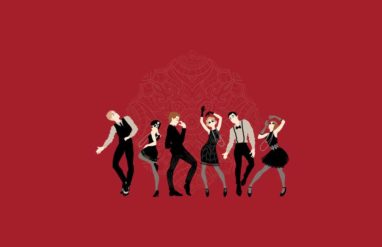In the age of LOL, WTF, and OMG, abbreviations are often looked at as a sign of the coming apocalypse. (Spoiler: LOL, WTF, and OMG are not the oldest abbreviations in English—you’re shocked, we know.)
So-called textspeak is viewed as a lesser form of English, and many people worry that pretty soon we’ll all be communicating solely in emoji. But, abbreviations aren’t exactly a new invention. They’re almost as old as the written word itself.
WATCH: What Is The Difference Between Abbreviations And Acronyms?
It’s easy to forget that we use abbreviations for almost everything, from the months of the year to abbreviating titles like doctor and misses. In some cases, there are even entire words that only exist because of abbreviations.
Here are some of the oldest abbreviations in the English language that prove shortening words and coming up with unique acronyms has always been a thing.
X, XXX, and XXXX
X might be one of those letters that leaves you cursing when it’s on your Scrabble tray, but it’s actually one of the most diverse abbreviations in the English language.
Most people recognize X as the roman numeral for the number 10, but one of the earliest and most common uses for X in English is as a symbol for a kiss. This usage dates back to the Middle Ages, when X was signed to represent the Christian cross at the end of a letter. The signer would then seal the document with a kiss to show sincerity. By the 1760s, this practice had evolved and spread all over the globe, and people signed letters using XOXO (kisses and hugs). The salutation has since evolved again to become the kiss-only signature XXXX in modern texts, chat messages, and emails.
WATCH: What Does "XXXX" Really Mean?
And over in the kitchen, X stays pretty sweet. It stands for all abbreviations related to sugar. So, XXXX is used as the marker on confectioners’ sugar to show that the sugar is extra fine.
But the letter X doesn’t only stand for all things chaste and sincere as you know. X was certified as a rating for adult content by the Motion Picture Association in 1968. Then, in the 1970s, the adult-film industry started using the XXX symbol we all recognize as a warning for pornographic content.
In that same vein of debauchery, XXX can also denote a strong malt liquor.
WATCH: Where Do "XX" And "XXX" Come From?
RSVP
RSVP comes from the 19th century French phrase répondez s’il vous plaît, which translates to “please respond.”
But while most modern English-speakers still write “RSVP” in all capital letters like a standard abbreviation,
RSVP itself has essentially become a new verb. You might see things like, “The gardening class is free to the public. RSVP to reserve a seat,” or “In order for us to reserve a party room, please RSVP by December 9.”
RSVP may have gotten its start as a polite reminder to reply to an invitation, but now, when it’s written on a modern birthday, wedding, or shower invitation, it’s more like a thinly veiled command to people to please let us know if we need to buy more appetizers.
POTUS, FLOTUS, and SCOTUS
It may seem like Twitter is responsible for the invention of the abbreviations POTUS, FLOTUS, and SCOTUS, since the terms became the official Twitter handles for the president, first lady, and the supreme court during Barack Obama’s two terms in office. But if these abbreviations for President of the United States, First Lady of the United States, and Supreme Court of the United States sound like something we collectively made up for the sake of efficiency while texting, that’s because we kind of did.
It’s just that the abbreviations were created for efficiency in a much older form of texting: the telegraph.
In 1879, Walter P. Phillips published The Phillips Telegraphic Code for the Rapid Transmission by Telegraph, which included the suggestion to use SCOTUS as an abbreviation for the supreme court. Shortly thereafter, POTUS started being used by telegraph operators. FLOTUS appeared later, in the 1980s, possibly as a Secret Service identifier for the first lady.
Who knew telegraph abbreviations were the OG textspeak?
I.e.
I.e. is an abbreviation for the Latin phrase id est meaning “that is,” or “in other words.” The abbreviation is used to provide an explanation for a previous paraphrase. “Many workers expect to put in a forty-hour week i.e., to work eight hours a day.”
Perhaps, what’s most interesting about this abbreviation is that it’s so old, it may actually be going extinct. It’s still used in formal writing, but it’d be a difficult ask to find instances of i.e. in most emails or on social media these days.
Save i.e.!
E.g.
Which of course brings us to e.g., which is another abbreviation for an old Latin phrase. In this case, it stands for exempli gratia, or “for example.” It’s used within a sentence to introduce an example of an earlier reference. “She loved exotic fruit, e.g., mangoes, passion fruit, and papayas.”
In 2019, it’s customary for people to just say “for example,” or even to use the word like to denote something similar. But given its convenience and simplicity, one could easily make a case for bringing back e.g. Try it sometime.
A.M. and P.M.
Most people know that A.M. means any time between midnight and noon, and P.M. is used to describe any time after noon and before midnight, but why?
Like many abbreviations that have been around seemingly forever, these two come from Latin phrases. A.M. is an abbreviation for ante meridiem, while P.M. comes from post meridiem. It’s easy to see why our forefathers decided to go with the abbreviations instead.
Awol
These days, awol is used as an adjective to describe “someone who isn’t present to perform their expected duties, particularly in the military,” but the term is actually an old school abbreviation. It stands for”absent without leave,” and it has been used in the United States since at least World War II.
The term going awol has since been incorporated into the popular lexicon and is used to describe everything from “an actual military absence” to “that one flaky friend who blows off your weekly friend group brunch.” You might hear coworkers say someone “went awol” if they took a long lunch and missed an important meeting. You might even think of the term going awol as the much older sibling of ghosting.
Etc.
Etc. is an abbreviation for the Latin phrase et cetera, which means “and others,” or “and so forth.” It’s still wildly popular in almost all forms of communication, including text, email, Instagram captions, etc. See what we did there?
Interestingly, etc. is essentially used as a complete replacement for its phrase of origin. Most English speakers pronounce the abbreviation just as they would et cetera, thus eliminating the need for the longer phrase.
Even though et cetera has been around since the year 1100, it’s looking like its shorter, sleeker abbreviation will be the form that goes the distance.
Snafu
Snafu is one of those perfect words that sounds exactly like what it means: “a badly confused or ridiculously muddled situation.” But what if we told you that snafu is actually an abbreviation?
The World War II-era abbreviation stands for “situation normal: all f*cked (or fouled) up.” Next time you find yourself thinking YOLO is a nonsense abbreviation, just think, in a few decades YOLO might be just as much a part of common English as snafu.














